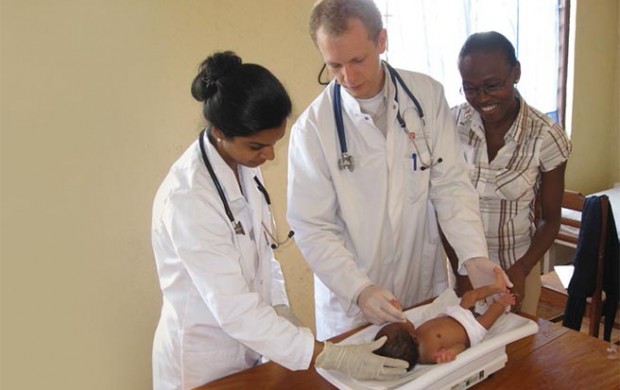Focus on Projects: Malaria in Pregnancy Consortium: research results
The Malaria in Pregnancy (MiP) consortium had its sixth and final annual meeting in Sitges, Spain on 24-26 June 2015. The objectives of the meeting were to share the latest MiP consortium’s research results from the clinical trials and cross-cutting activities. Participants also reviewed the data from the projects that have been presented to the WHO Evidence Review Group in July 2015.
EDCTP funded three projects under the umbrella of the MiP consortium focusing on finding new drugs to treat and/or prevent malaria infection in pregnancy. These trials together recruited more than 15,000 African women. They were followed through pregnancy and the outcomes regarding the children that were born were studied. The trials have provided an extensive resource on malaria in pregnancy. The individual studies are summarised below.
1 – PREGACT
The PREGACT trial, led by Professor Umberto D’Alessandro (MRC The Gambia Unit), recruited 3,428 pregnant women with confirmed malaria infection in four countries (Burkina Faso, Ghana, Malawi and Zambia) in order to test the safety and efficacy of antiretroviral treatments (ACTs) (dihydroartemisininpiperaquine, mefloquine-artesunate, amodiaquineartesunate and artemether-lumefantrine) when administered to pregnant women with P. falciparum infection during the second and the third trimester. Initial findings will be published in 2015. The results will feed directly into the WHO malaria treatment guidelines, in particular, regarding the performance of dihydroartemisinin-piperaquine, for which no recommendation was made earlier due to lack of data. Follow-up of the children born to the pregnant women in the trial is ongoing, as is the laboratory analysis of the data on pharmacokinetics and placental infection.
2 – Mefloquine for IPTp?
Given the rising resistance to sulphadoxine/pyrimethamine (SP), a consortium led by Professor Clara Menéndez (Hospital Clinic of Barcelona, Spain) conducted two trials to look at the potential for using mefloquine (MQ) as an alternative to SP. The first trial compared the safety, tolerability and efficacy of MQ to SP as intermittent preventive treatment in pregnancy (IPTp) for mothers (HIV-uninfected women) and their infants. The trial recruited 4,749 pregnant women in Benin, Gabon, Mozambique, and Tanzania and compared two-dose MQ or SP for IPTp and MQ tolerability of two different regimens.
The results indicated that there was no difference in low birth weight prevalence (primary study outcome), as well as no differences in the prevalence of placental infection and adverse pregnancy outcomes between groups. Women receiving MQ had reduced risk of parasitaemia and anaemia at delivery and reduced incidence of clinical malaria. Despite these positive results, tolerability was poorer in the two MQ groups compared to SP. The most frequently reported related adverse events were dizziness and vomiting, with similar proportions in the full and split MQ arms. These findings do not support the use of MQ instead of SP for IPTp.
A second trial evaluated the safety and efficacy of MQ as IPTp for malaria in HIV-infected pregnant women receiving cotrimoxazole prophylaxis (CTXp) and long-lasting insecticide treated nets (LLITNs). A total of 1,071 HIV-infected women from Kenya, Mozambique, and Tanzania were randomised to receive either three doses of IPTp-MQ (15 mg/kg) or placebo given at least one month apart; all women received cotrimoxazole preventive therapy and a bed net. The IPTp-MQ arm was associated with reduced rates of maternal parasitaemia, placental malaria, and reduced incidence of non-obstetric hospital admissions. There were no differences in the prevalence of adverse pregnancy outcomes between groups.
Despite these positive findings, drug tolerability was poorer in the MQ group (dizziness and vomiting). Unexpectedly, HIV viral load at delivery was higher in the MQ group compared to the control group (p = 0.048) and the frequency of perinatal mother-to-child transmission of HIV was increased in women who received MQ. The trial results, which were published in 2014, confirmed that MQ was not well tolerated which limits its potential for IPTp.
A commentary on these results by the editor of PLOS Medicine highlighted the need for increased attention on malaria in pregnant women and their children and called for a re-examination of strategies to prevent malaria in pregnancy, citing the potential utility of the intermittent screening and treatment approach which was the subject of two EDCTP-funded trials.

3 - IPTp-SP and resistance
Current WHO policy recommends intermittent preventive treatment with sulphadoxine-pyrimethamine (IPTp-SP) in pregnancy. However, this policy is at risk due to increasing parasite resistance to SP. These problems prompted the IPT-SP study, coordinated by Professor Feiko ter Kuile (Liverpool School of Tropical Medicine, UK). The study investigates the declining IPTp effectiveness and studies alternative approaches to IPTp-SP.
The ISTp-A trial recruited 5,354 pregnant women across Burkina Faso, Ghana, Mali and The Gambia. Women were randomised to receive either IPTp-SP (which is the current policy) or scheduled intermittent screening and treatment in pregnancy (ISTp). The trial demonstrated that despite growing concerns about the impact of SP resistance in East and Southern Africa, SP remains effective at clearing existing infections and improving haemoglobin concentration when provided as IPTp to asymptomatic pregnant women in Mali and Burkina Faso. Results on impact on the birth parameters will soon be published.
The ISTp-B trial conducted in Malawi comparing ISTp with IPTp-SP showed that the effectiveness of IPTp is compromised in areas where the PfDHPS A581G mutation is present in the parasite populations. The results of this trial and the data on the relationship between SP resistance and SP-IPTp effectiveness were presented at the WHO Evidence Review Group on Malaria in Pregnancy.
